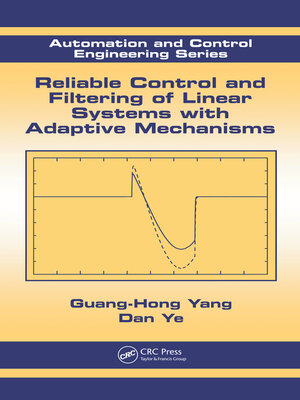Reliable Control and Filtering of Linear Systems with Adaptive Mechanisms
ebook ∣ Automation and Control Engineering
By Guang-Hong Yang

Sign up to save your library
With an OverDrive account, you can save your favorite libraries for at-a-glance information about availability. Find out more about OverDrive accounts.
Find this title in Libby, the library reading app by OverDrive.



Search for a digital library with this title
Title found at these libraries:
| Library Name | Distance |
|---|---|
| Loading... |
More and more, the advanced technological systems of today rely on sophisticated control systems designed to assure greater levels of safe operation while optimizing performance. Rather than assuming always perfect conditions, these systems require adaptive approaches capable of coping with inevitable system component faults. Conventional feedback control designs do not offer that capability and can result in unsatisfactory performance or even instability, which is totally unacceptable in complex systems such as aircraft, spacecraft, and nuclear power plants where safety is a paramount concern.
Reliable Control and Filtering of Linear Systems with Adaptive Mechanisms presents recent research results that are advancing the field. It shows how adaptive mechanisms can be successfully introduced into the traditional reliable control/filtering, so that, based on the online estimation of eventual faults, the proposed adaptive reliable controller/filter parameters are updated automatically to compensate for any fault effects.
Presenting a new method for fault-tolerant control (FTC) in the context of existing research, this uniquely cohesive volume, coauthored by two leading researchers —
The authors also extend the design idea from linear systems to linear time-delay systems via both memory and memory-less controllers. Moreover, some more recent results for the corresponding adaptive reliable control against actuator saturation are included. Ultimately, this remarkably practical resource, offers design approaches and guidelines that researchers can readily employ in the design of advanced FTC techniques offering improved reliability, maintainability, and survivability.







